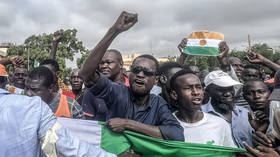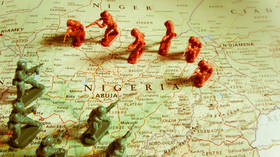How the US and France created a Niger mess for themselves
Neo-colonial powers have become entangled in a diplomatic and military impasse borne from a fundamental lack of understanding
The military coup in Niger is over three weeks old. The military government is cementing its rule, having gained the upper hand in the shadow play with the Economic Community of West African States (ECOWAS) backed by ex-colonial powers ravaging that desperately poor West African state rich in mineral wealth – France, Germany, and Italy – and the United States.
The prospects of Niger’s pro-Western President Mohamed Bazoum being reinstated look dim. He is an ethnic Arab with a small power base in a predominantly African country, hailing from the migrant Ouled Slimane tribe, which has a history of being France’s fifth column in the Sahel region locked in a struggle with the ancient Tuareg people, the large Berber group that principally inhabits the Sahara in a vast area stretching from Libya to Algeria, Niger, Mali, Burkina Faso, and northern Nigeria.
ECOWAS lost the initiative once the coup leaders defied its August 6 deadline to release Bazoum and reinstate him on pain of military action. In fact, the coup leaders have since audaciously threatened the visiting US Deputy Secretary of State Victoria Nuland (who famously choreographed and navigated the transition following the coup in Ukraine in 2014) that they would physically eliminate Bazoum if she pushed the envelope.
The coup in Niger has been a humiliating setback for France too, and a terrible drama for President Emmanuel Macron, who has been striding the global stage as a passionate advocate of Ukraine’s national sovereignty espousing the ‘this-is-not-an-era-of-wars’ thesis to speak and act in a contrarian direction over Niger. Macron is egging ECOWAS on to invade Niger and rescue Bazoum, but that seems an increasingly futile effort.
For Macron personally, this has been a terrible occurrence, as he has lost his best supporter in Africa for France’s neo-colonial policies. He misread the groundswell behind the coup and gambled that Niger’s military would splinter. To be sure, his overreaction boomeranged as the coup leaders overnight abrogated the military pacts with Paris. And the latent animosity toward France has surged on account of its predatory policies in Niger.
France has ceded the leadership in the emergent situation to Washington. As a political scientist and professor at the French Institute of Political Studies, Bertrand Badi, puts it, this “is a very significant humiliation in the African context and shows that he [Macron] made a mistake in his calculations.” Badi went on to make an interesting point that fundamentally, France has failed to “get rid of all its colonial history.”
“The great drama of France is that it doesn’t know how to turn the page, in France’s inability to redefine itself… France, since independence by the African states, has pursued a schoolteacher diplomacy based on the temptation to give lessons and distribute punishments.” Badi concluded that France probably did not understand that African societies have changed since then.
Not only France, but Western powers on the whole do not understand that the African people have a highly politicized mindset, thanks to the violent, bitterly fought national liberation movements. Unsurprisingly, Africa has been quick to adapt to the space opening up for them in the multipolar setting to negotiate with the ex-colonial masters. The savviness with which the coup leaders in Niamey are acting takes the breath away.
General Abdourahmane Tchiani, the titular head of the coup, refused to meet Nuland. She and other US officials asked to see Bazoum in person when they visited Niger on Monday, but the answer was no. Even with a hefty $200 million of annual US aid at stake, the Nigerien generals weren’t interested in Nuland’s offer.
Instead, she had to sit across the table and negotiate with the commander of Niger’s Special Operations Forces and one of the leaders of the coup, Brig. Gen. Moussa Salaou Barmou, who serves as chief of defense. Barmou attended the US National Defense University and was trained at Fort Benning in Georgia. Yet, he was handpicked to threaten Nuland that the deposed president would be executed if neighboring countries attempted a military intervention to restore his rule. US Senator Chris Murphy later wryly remarked: “It’s a disturbing trend, and a sign of how badly misallocated our national security spending is on the [African] continent.”
The Intercept has since revealed that Barmou was not the only US-trained Nigerien general involved in the coup. “Two weeks after Niger’s coup, the State Department has still not provided a list of the US-connected mutineers, but a different US official confirmed that there are ‘five people we’ve identified as having received [US military] training,’” the investigative news outlet said.
The US faces a messy situation in Niger. The plain truth is, if the Biden administration has not formally labeled the military takeover a coup, it is because such a designation will not permit further security assistance to Niger. The US has a 1,100-strong military presence in the country and, more importantly, a drone base, known as airbase 201, near Agadez in central Niger built at a cost of more than $100 million, which has been used since 2018 for operations in the Sahel.
The US is so much on the back foot that a Reuters report stated that “one of the US officials said if [Russian private military contractor] Wagner fighters turn up in Niger it would not automatically mean US forces would have to leave. The official said a scenario where a few dozen Wagner forces base themselves in Niger’s capital Niamey was unlikely to affect the United States’ military presence. But if thousands of Wagner fighters spread across the country, including near Agadez, problems could arise because of safety concerns for US personnel… Regardless, the US will put a high bar for any decision to leave the country.”
This bravado is notwithstanding the fact that the Wagner Group (whose reported operations in various African countries, though in few cases confirmed by the respective governments and almost never commented on by the Kremlin, are a source of much concern and speculation by Western commentators and officials) is under sanctions by the US – as well as Australia, Canada, Japan, the UK, and the European Union – as a foreign “terrorist organization” on a par with Islamic State.
The good part is that in this bizarre state of play, the US also cannot afford a military intervention in Niger by ECOWAS, lest its military presence become untenable in such a chaotic atmosphere. Of course, the coup leaders in Niamey have been smart enough not to make any demand so far to remove American troops from Niger.
As regards the drone base, the leading Africa specialist at the Center for Strategic and International Studies in Washington, DC, Cameron Hudson, also a former US official, estimates it is likely that Washington will try to keep using the facility irrespective of who is in charge of Niger. Now, that is not really problematic since the Pentagon’s own map of the network of 29 US bases across Africa shows these footprints are far from located in pristine, lily-white democracies.
The statements, views and opinions expressed in this column are solely those of the author and do not necessarily represent those of RT.







Comments are closed.